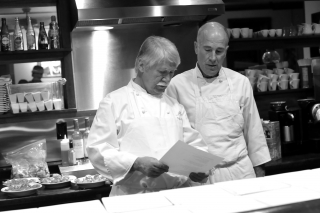
Back to Basics Critical to Success
30 August 2021Never shy away from reinforcing basic habits that define a cook’s and culinary program’s brand.
By Paul Sorgule, MS, AAC
The recipe for a balanced culinary education includes many parts: technical chops, an understanding of numerous cultures and their food traditions, a touch of chemistry, a heavy dose of nutrition, food sanitation and safety, cost controls and accounting, planning, problem-solving, purchasing, and understanding the supply chain, etc.
There is much to learn and so much more to add to a cook’s bag of tricks over the duration of his or her career. However, we should never lose sight of the importance of basics – the habits that educators strive to instill in every graduate – habits that will serve them well throughout a rewarding career.
Whether a student is fresh out of high school with a skill bag that is quite empty, a somewhat-seasoned cook with a few kitchen years under his or her belt, or an upper classman who hungers for more advanced work – the basics will always float to the top as critical to success. We should never shy away from reinforcing those basics, those habits that will define a student’s personal brand and that of your culinary program.
As we all begin a new academic year, here is one very important step toward building a habit that will define your graduates throughout their time in the kitchen: the roll call. I have always found this to be one of the most significant habits you can help reinforce. It’s a habit that will set a tone for each student, follow them every day of their lives, establish important standards in the kitchens they will eventually operate, impress current and future employers, and demonstrate just how serious your graduates are as cooks, chefs and future restaurateurs.
Line your students up before any kitchen class begins. Make sure you follow the military model of toes on a floor line, arms-length distance apart from each other, and standing at attention. In the next few minutes, you will define how your kitchen will operate, the level of respect each student will have toward each other, the intended search for excellence, and pride in the uniform they wear as well as the school and industry they represent.
Now, very methodically step in front of each student – just like that drill sergeant in basic training – and inspect each student head to toes. Check for clean-shaven gentlemen, minimal make-up, trimmed and scrubbed nails and hands, properly pressed and spotless uniforms, contained hair, plain white t-shirts under their chef coat, calibrated pocket thermometer, jewelry removed (except wedding bands), polished shoes, and impeccable personal hygiene.
Look them in the eye to determine how serious they are about their craft and ask a question or two about the previous day’s class or homework assignment. If all is in order, then release them to set up their workstation. If anything is out of order, make sure you have an ironing board and iron on hand, extra hats, nail clippers and nail brushes, razors and shaving cream, and even a handful of new toothbrushes and toothpaste if the need arises. They must pass inspection before they earn the right to work with food. You may do something like this already, if so GREAT. You need to take it seriously and be consistent.
Check to ensure they sanitized their workstation, sharpened their knives, and prepared a few notes as a guide for the work they are about to begin. Make sure an assigned student has set the three-bay sink to receive pots and pans and each student has once again washed his or her hands properly before handling food. All of this will take maybe 15 minutes and will demonstrate just how important the basics are. Basics that will become their method of operation from that point on. The quality of everything else a student does in kitchen is built off the first 15 minutes. This is the first step toward excellence. This is a critical part of our job as teachers, to demonstrate and reinforce that. “Excellence is not a destination; it is a constant journey that never ends.” – Brian Tracy
Excellence is a habit.
PLAN BETTER – TRAIN HARDER
Paul Sorgule, MS, AAC, president of Harvest America Ventures, a mobile restaurant incubator based in Saranac Lake, N.Y., is the former vice president of New England Culinary Institute and a former dean at Paul Smith’s College. Contact him at This email address is being protected from spambots. You need JavaScript enabled to view it..
